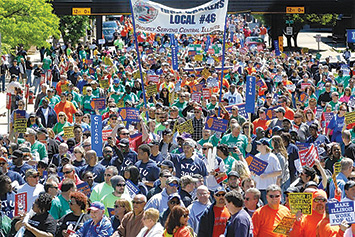Illinois Senate approves proposed constitutional amendment banning so-called ‘right-to-work’ laws

Springfield, IL – The Illinois Senate on May 21 passed and sent to the House a proposed constitutional amendment that would establish a fundamental right of employees to unionize and engage in collective bargaining.
Sen. Ram Villivalam, (D-Chicago), lead sponsor of the measure in the Senate, said the amendment is a response to the relatively stagnant wages most workers have seen since the 1970s when union membership nationally began to decline.
“The falling rate of unionization has lowered wages, not only because some workers no longer received the higher union wage, but also because there is less pressure on nonunion employers to raise wages,” he said. “The ability of unions to set Labor standards has declined.”
The measure – Senate Joint Resolution Constitutional Amendment 11 – passed the Senate by a vote of 49-7, with 11 Republicans joining Democrats in supporting it. It now goes to the House where it will need a three-fifths majority, or 71 votes, to pass. If it does, it would then be up to Illinois voters to approve during the November 2022 general election.
The proposed amendment would add a section to the Illinois Constitution’s Bill of Rights stating, “Employees shall have the fundamental right to organize and to bargain collectively through representatives of their own choosing for the purpose of negotiating wages, hours, and working conditions, and to protect their economic welfare and safety at work.”
Under the amendment, no law could be passed to prohibit the ability of workers to collectively bargain over wages, hours, terms and conditions of work. The measure would effectively ban the phony “right-to-work” laws.
Sen. Rachelle Crowe (D-Glen Carbon) and Sen. Christopher Belt (D-Cahokia) both voted for it. Sen. Jason Plummer (R-Edwardsville) voted against it. Crowe and Sen. Doris Turner (D-Springfield) were co-sponsors.
In “right-to-work” states, individuals in a collective bargaining unit may receive the benefits of collective bargaining agreements, including higher wages and benefits that unions earn through the bargaining process, regardless of whether they pay dues for the representation. In other words, they become “free loaders.”
“Right to Work” laws effectively serve to decrease funds to a union, making it difficult to collectively bargain, thereby reducing unions’ bargaining power.
Currently, 28 states have some form of “right-to-work” laws on the books.
In 2015, the village of Lincolnshire, at the urging of then-Gov. Bruce Rauner, a Republican, attempted to pass a local “right-to-work” ordinance. The ordinance was later struck down by a federal court, which said only state governments could enact such laws. Two years later, the General Assembly passed a union-backed bill to prevent local governments from establishing “right-to-work” zones, but it was vetoed by Rauner, and an attempt to override that veto fell one vote short in the House.
In 2019, however, lawmakers passed another such bill, which was signed into law by Democratic Gov. J.B. Pritzker.



Leave a Reply